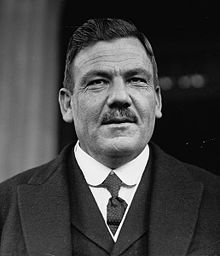Plutarco Calles
| Plutarco Elías Calles | |
|---|---|
 |
|
|
40th President of Mexico |
|
|
In office December 1, 1924 – November 30, 1928 |
|
| Preceded by | Álvaro Obregón |
| Succeeded by | Emilio Portes Gil |
| Personal details | |
| Born |
September 25, 1877 Guaymas, Sonora |
| Died | October 19, 1945 (aged 68) Mexico City |
| Nationality | Mexican |
| Political party | Laborist Party (PL), after 1929 National Revolutionary Party (PNR) |
| Spouse(s) | Natalia Chacón (1879-1927) |
| Military service | |
| Allegiance |
|
| Service/branch |
|
| Years of service | 1914-1920 |
Plutarco Elías Calles (Spanish pronunciation: [pluˈtarko eˈli.as ˈkaʎes]; September 25, 1877 – October 19, 1945) was a Mexican general and politician. He was the powerful interior minister under President Álvaro Obregón, who chose Calles as his successor. The 1924 Calles presidential campaign was the first populist presidential campaign in the nation's history, as he called for land redistribution and promised equal justice, more education, additional labor rights, and democratic governance. Calles indeed tried to fulfill his promises during his populist phase (1924–26), but entered an anti-clerical phase (1926–28).
After leaving office he continued to be the dominant leader from 1928–1935, a period known as the maximato. Calles is most noted for a fierce backlash against Catholics, which led to the Cristero War, a civil war between Catholic rebels and government forces, and for founding the Partido Nacional Revolucionario (National Revolutionary Party, or PNR), which became the Partido de la Revolución Mexicana (Party of the Mexican Revolution, or PRM), which eventually became the Institutional Revolutionary Party (PRI), that governed Mexico from 1929 to 2000 under these three different names.
Francisco Plutarco Elías Campuzano grew up in poverty and deprivation, one of two natural children of his alcoholic bureaucrat father, Plutarco Elías Lucero, and his mother María Jesús Campuzano Noriega. He adopted the Calles surname from his mother's sister's husband, Juan Bautista Calles, who with his wife María Josefa Campuzano raised him after the death of his mother. His uncle was from a family of school teachers, but himself was a small-scale dealer in groceries and alcoholic beverages. Plutarco's uncle was an atheist, and he instilled in his nephew a strong commitment to secular education and an attitude of disdain toward the Roman Catholic Church. This was later reflected in his social agenda, which included expansion of public education and the removal of church influence from education, politics and unions.
...
Wikipedia
